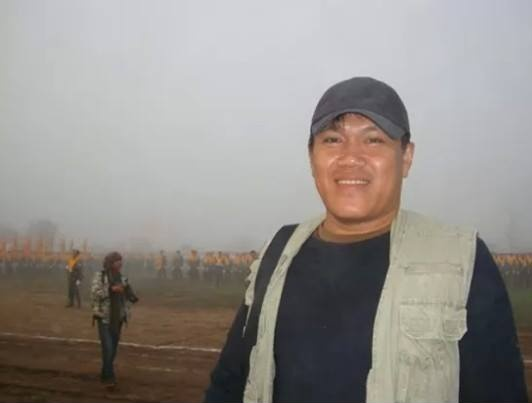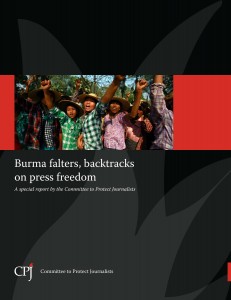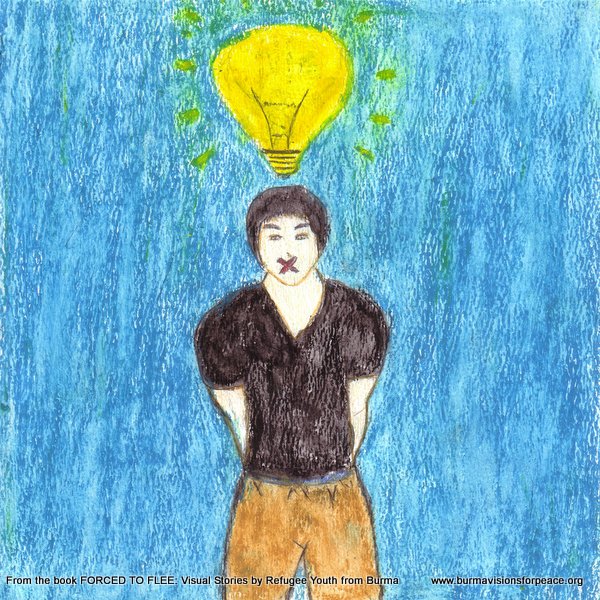Posts Tagged ‘Committee to Protect Journalists’ (11 found)
10 Most Censored Countries
Despite an end to more than four decades of pre-publication censorship in 2012, Myanmar’s media remains tightly controlled. The Printers and Publishers Registration Law, enacted in March 2014, bans news that could be considered insulting to religion, disturbing to the rule of law, or harmful to ethnic unity. […]
• • •World Press Freedom Day or World Press Restrictions Day?
Sunday 3 May, 2015 was World Press Freedom Day and the Burma Army embraced the sentiment of this day by issuing a gaging order on the media, aimed at stopping them from reporting on statements by the ethnic armed group, the Myanmar National Democratic Alliance Army (MNDAA) with which the Burma Army is at war with. Meanwhile, 12 journalists remain in prison, demonstrating why the Committee to Protect Journalists (CPJ) designated Burma as the 9th most censored country in the world.
Five of the most high profile incarcerated media workers, four journalists and the chief executive officer of the Unity Journal, have been in prison since reporting on a secret chemical weapons factory of the Burma Army in January 2014. They are serving seven years with hard labor after being charged under the colonial-era State Secrets Act. International human rights group, Amnesty International, brought attention to this issue on World Press Freedom Day, encouraging supporters to post ‘#FreeUnityFive’ on the Burma Government’s Information Minister’s Facebook wall. It is not just the Unity five that are in prison. Seven more media workers spent World Press Freedom Day without their freedom, including five from the Bi-Midday Sun newspaper and two from the Myanmar Post Weekly […]
• • •Justice for the Killing of Journalist by Burma Army Must be Found
 News of the murder of a journalist by the Burma Army while being held in custody should send shockwaves across the country and beyond, but sadly it is not much of a surprise for those who are aware of the abusive nature of the most powerful institution in Burma. What will transpire next will be a clear indicator of the Government’s will to pursue justice and end the impunity that the Burma Army has enjoyed for so long. Not many are optimistic.
News of the murder of a journalist by the Burma Army while being held in custody should send shockwaves across the country and beyond, but sadly it is not much of a surprise for those who are aware of the abusive nature of the most powerful institution in Burma. What will transpire next will be a clear indicator of the Government’s will to pursue justice and end the impunity that the Burma Army has enjoyed for so long. Not many are optimistic.
Aung Kyaw Naing, also known as Ko Par Gyi, was a freelance journalist covering the recent clashes in eastern Burma between the Democratic Karen Benevolent Army (DKBA) and the Burma Army and its’ proxy Border Guard Force (BGF). After visiting Kyaikmayaw, Mon State, the scene of heavy clashes in September 2014, Ko Par Gyi went missing. His wife, Ma Than Dar, began to search for him and held a press conference on 21 October in Rangoon stating that he was being held in custody by the Burma Army and demanded his immediate release. Just a few days later, a statement was issued to the Myanmar Press Council (Interim) by an aide to commander-in-chief of the armed forces, Min Aung Hlaing, that detailed Ko Par Gyi’s death while in custody. The statement claims that Ko Par Gyi was a captain for the Klohtoobaw Karen Organization (KKO), the political wing of the DKBA, and was shot dead while trying to escape. The DKBA has denied that Ko Par Gyi was indeed a member of their organization […]
• • •Journalist Killed in Military Custody in Burma
Bangkok, October 24, 2014–Burma’s army shot dead freelance reporter Aung Kyaw Naing while the journalist was in military custody, according to news reports. The Committee to Protect Journalists condemns the journalist’s killing, the first in Burma since 2007[…]
• • •Burma’s Irrawaddy Threatened, Hit by Cyberattacks
Bangkok, October 3, 2014–The Committee to Protect Journalists strongly condemns recent threats and cyberattacks against The Irrawaddy, an independent media group dedicated to Burma news and analysis[…]
• • •Burma Falters, Backtracks on Press Freedom
 The media landscape in Burma is more open than ever, as President Thein Sein releases imprisoned journalists and abolishes the former censorship regime. But many threats and obstacles to truly unfettered reporting remain, including restrictive laws held over from the previous military regime. The wider government’s commitment to a more open reporting environment is in doubt […]
The media landscape in Burma is more open than ever, as President Thein Sein releases imprisoned journalists and abolishes the former censorship regime. But many threats and obstacles to truly unfettered reporting remain, including restrictive laws held over from the previous military regime. The wider government’s commitment to a more open reporting environment is in doubt […]
Draft Media Law a Step Backward for Burma
Draft legislation designed to govern the media in Burma threatens to reverse fragile press freedom gains recently achieved under President Thein Sein’s democratic reform program, the Committee to Protect Journalists said today […]
• • •10 Most Censored Countries
Shutting out international media and imposing dictatorial controls on domestic coverage, the Horn of Africa nation of Eritrea has emerged as the world’s most censored country, the Committee to Protect Journalists has found in its newly updated analysis of press restrictions around […]
• • •In Burma, transition neglects press freedom
Thein Sein’s new civilian government has promised reform, but Burma remains one of the most restricted nations in the world for the press. A CPJ investigation finds a regime that heavily censors news reports and regularly imprisons journalists […]
• • •Free the Democratic Voice of Burma’s Video Journalists
Despite pledges by Burma’s new government that it has begun the transition to civilian rule, 17 video journalists (VJs) for the Oslo-based exiled media organisation, the Democratic Voice of Burma (DVB), remain imprisoned. They are among nearly 2,100 political prisoners in Burma, a testament to the lingering hold of dictatorial rule on the country […]
• • •









 All posts
All posts